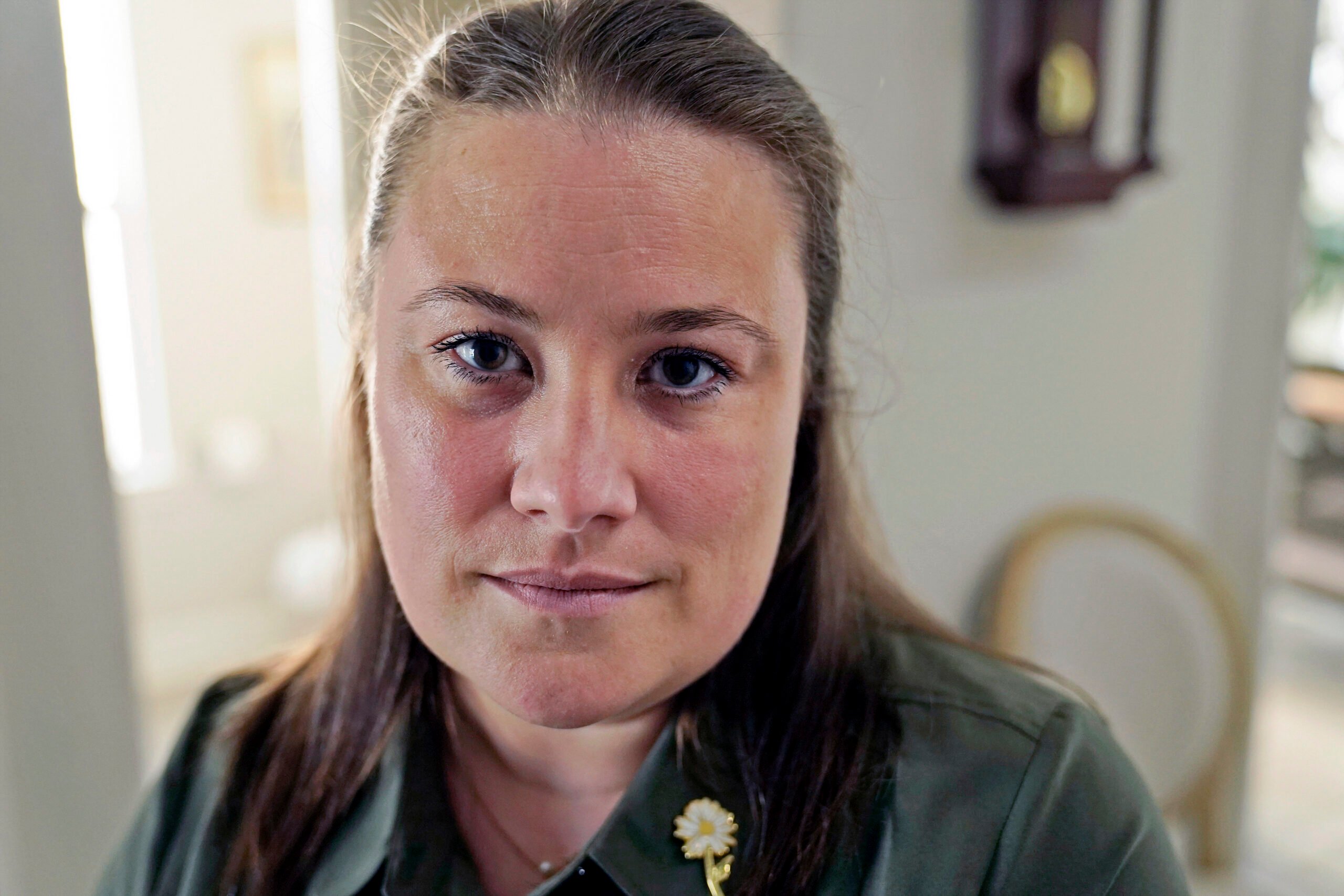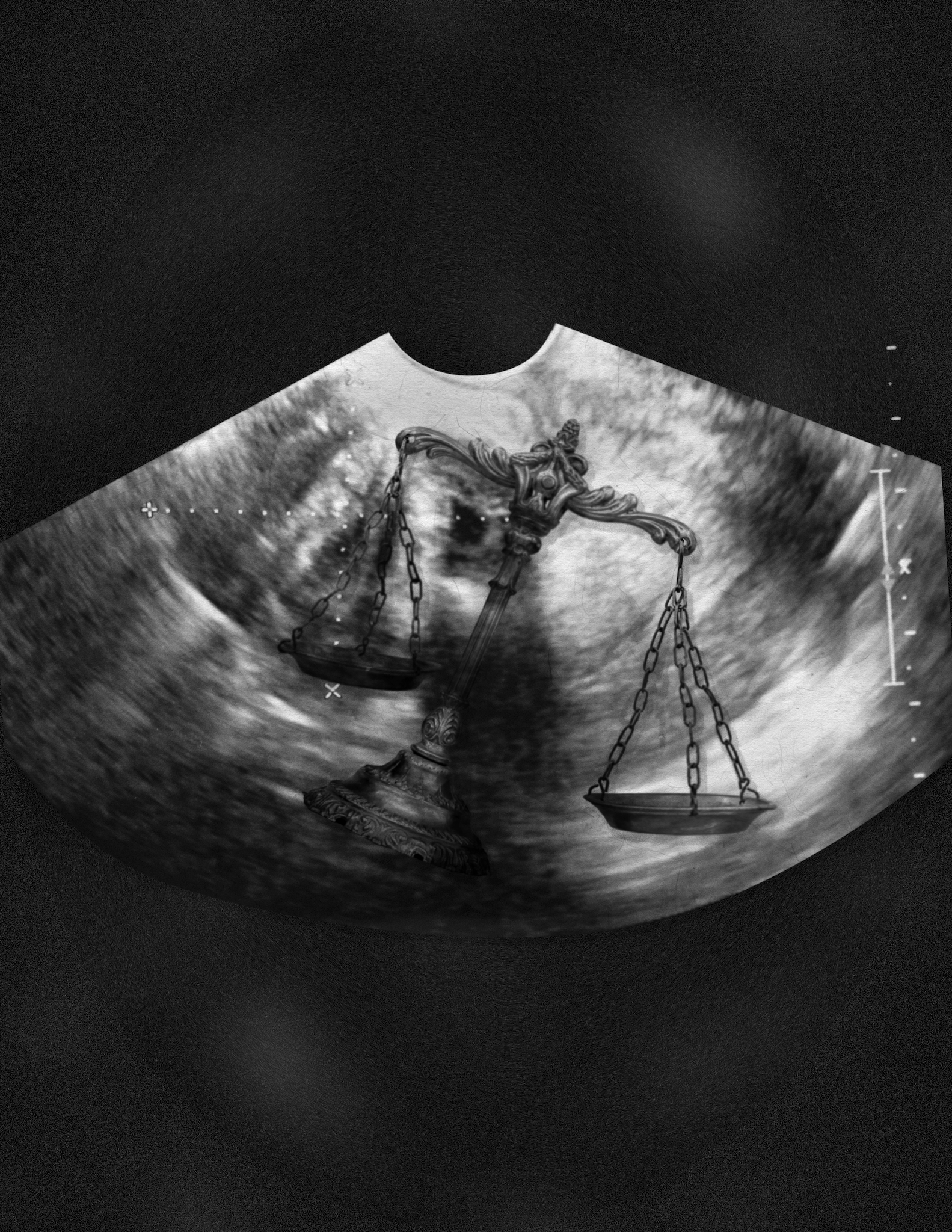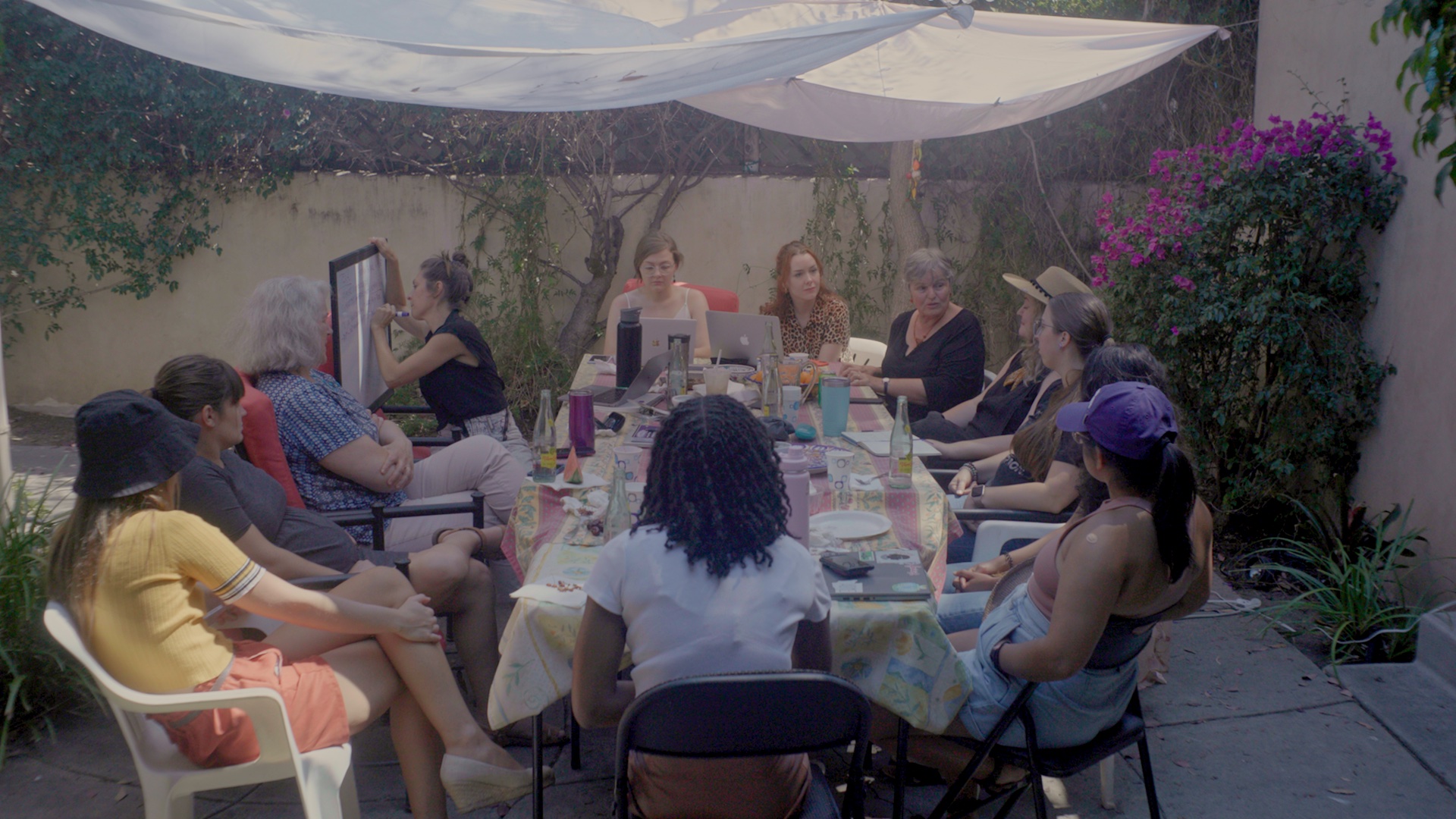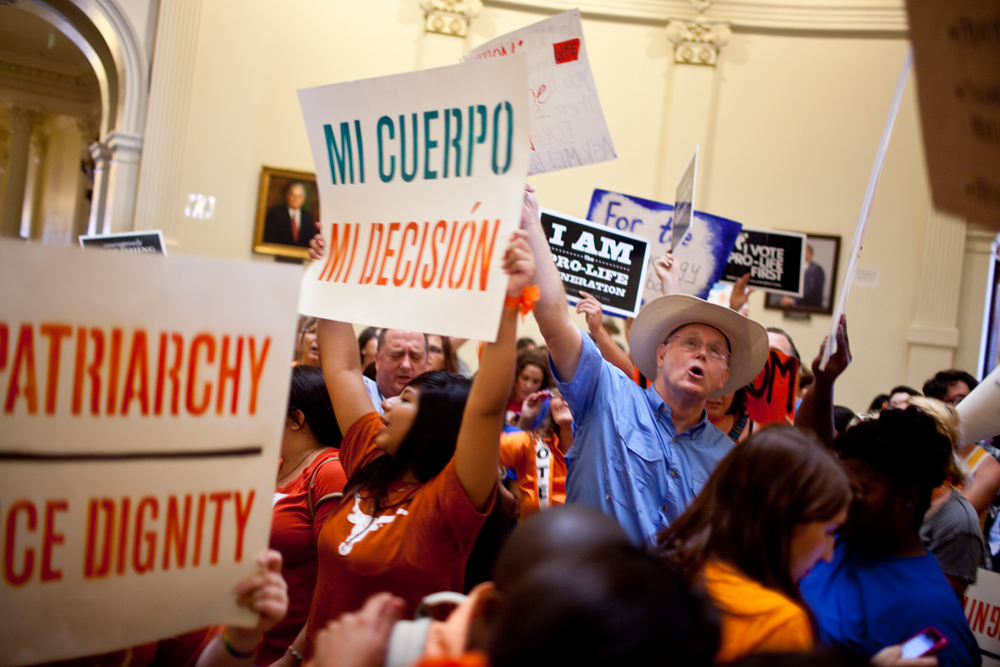
Texas House Approves Abortion Bill HB 2
9:15 p.m.: When folks following the progress of HB 2 arrived at the Texas Capitol this morning, the dew was still wet on the statehouse lawn. When they trailed out nearly 11 hours later, the sun had already set. To no one’s surprise, the Texas House had tentatively approved the most restrictive anti-abortion bill ever to be debated beneath the Capitol dome.
In fact, even the way the House debated the bill wasn’t very surprising. After all, intricate arguments for and against a 20-week abortion ban, costly facility upgrades, and restrictions on medical abortions had already been aired: twice in the House chamber, once in the Senate chamber, and four times in protracted, crowded and sometimes raucous public hearings. Everyone knew what would happen when they came here today.
Nonetheless, Democratic representatives made a good faith effort to sustain debate when they filed 22 amendments to the bill.
Some amendments were startling obvious: exceptions for victims of sexual assault; for women suffering from mental illness; for the range of medical conditions that could reduce the quality of life of women or child; or for physicians when making medical decisions. Some amendments were just plain sensible: endorsing measures for reducing unplanned pregnancies; providing safety net services for women during their unplanned pregnancies; protecting the health and safety of children who would be born to parents who didn’t want them. And some amendments were more wild such as linking the validity of the HB 2 to the abolition of the death penalty.
Yet regardless of which were obvious and which audacious, all amendments went the way of the table. That is, they were roundly and resolutely ignored.
To enliven debate, some representatives brandished props. A rape kit, a bent coat hanger, a yellow feather, a knitting needle, and a bottle of turpentine all made an appearance via the Dems. In contrast, GOP representative Jason Villalba (R-Dallas) waved a sonogram image of his 13-week-old fetus son, boasting (somewhat early) that he could sit “crisscross applesauce” in his mother’s womb. But after 11 hours of debate, 22 amendments and reasonably energetic arguments on both sides, the House did what they were going to do. They voted along party lines to pass HB 2 to engrossment.
Tomorrow at 10 a.m., HB 2 will have the third reading in the House and then pass to the Senate for final approval. But tonight, long after the House chamber emptied, orange-clad crowds thronged in the statehouse and their chants of “Shame!” and “We will not be bullied!” echoed in the hallways of the Capitol.
6:46 p.m.: Capitol rotunda, full of anti-choice crowd till now, packed with chanting folks in orange.

5:09 p.m.: Rep. Ruth Jones McClendon (D-San Antonio) proposed an amendment to improve teenagers’ access to sex education, thereby reducing the need for abortions. But you guessed it: GOP reps shot it down. Of course, the debate over HB 2 is about more than just abortion, even if the language of the bill doesn’t suggest it.
By the time you get to the bottom of this screen, a Texan teen will become pregnant. Statistically, this will be bad for her health. She’s more likely to receive poor prenatal care, to suffer from hypertension and anemia, to deliver her baby too soon. Moreover, the risk-taking behavior that got her pregnant also exposes her to sexually transmitted infections. One unplanned pregnancy often leads to another. Worse, if this teen mom is black or Latina or lives in rural Texas, her health outlook is especially bleak.
If this future teen mom attends a school district that promotes abstinence-only sex education then, ironically, she may still be carrying the pledge card she’d signed in health class: “Starting today, I pledge to abstain from sexual activity until marriage, as this is the only proven way to protect myself from out-of-wedlock pregnancy and STDs.” The problem? There’s no proof that abstinence-only programs work.
Trying to keep kids chaste until marriage is a big deal in Texas, driven by a socially conservative ideology at the state and local level. A 2011 Texas Freedom Network survey found that 75 percent of the thousand-plus school districts in Texas promote abstinence-only sex ed, though research shows that the abstinence-only approach doesn’t produce the desired outcomes. Nonetheless, the state health department funnels $6 million annually towards abstinence-only education. Moreover, some Texas towns experience spittle-flying fights if an evidence-based program is proposed. Yet the facts remain: the Lone Star State ranks third in the nation for teen pregnancies, first for repeat teen births, and has one of the highest teen chlamydia rates in the U.S. Is there a correlation between Texas’ favorite form of sex ed and poor health outcomes? If so, why do Texans cleave to an education policy that doesn’t work?
Good question, especially when GOP representatives are currently defending a bill to reduce access to abortions but are also resisting access to effective sex education for that same group of people.
3:51 p.m.: Amendments proposed by the Democrats continue to be systematically shot down.
Rep. Donna Howard (D-Austin) offered an amendment that would allow clinics to have either transfer agreements or admitting privileges with hospitals, thus bringing the regulations in line with those required of ambulatory surgical care centers. In quoting a letter from the Texas Hospital Association, Howard noted that the ‘admitting privileges’ part of HB 2 was unnecessary anyway because hospitals don’t grant admitting privileges to physicians who don’t perform services inside their hospital. Moreover, as Howard (trained as a critical care nurse) explained to Rep. Laubenberg, patients are more likely to go to the nearest emergency room rather than one to which their doctor has admitting privileges. Thus the admitting privileges clause is pointless … thus the amendment might give it some relevance. But Laubenberg declined the offer and moved to table the amendment. Her GOP colleagues voted in agreement.
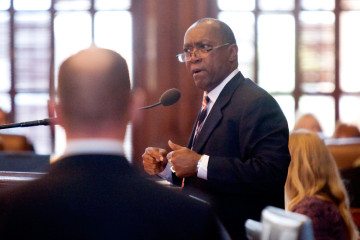
Next Rep. Sylvester Turner (D-Houston) took the mic. He proposed an amendment to state that, if a hospital has a written policy of not granting admitting privileges to physicians, then abortion physicians would not need to comply with this section of the bill. There followed a brief flutter of excitement when Rep. Turner noted that he had tried to raise this amendment, as well as a few others, in the House State Affairs Committee last week. But the chair, Rep. Byron Cook (R-Corsicana), had refused to accept them. Turner then raised a point of order about the date on which the committee recorded the date of the vote: the paperwork said that it had happened on July 2 but in fact it was July 3. As the events of last session’s Senate filibuster taught us, clocks matter. For the next 20 minutes or so, we saw an extended POO (“point of order,” for the uninitiated) huddle around the dais. But after much discussion, inaudible to the public, the chair over-ruled the point of order and a House vote upheld it. Debate about Turner’s amendment limped on for a little while longer until it was eventually tabled by the GOP House majority.
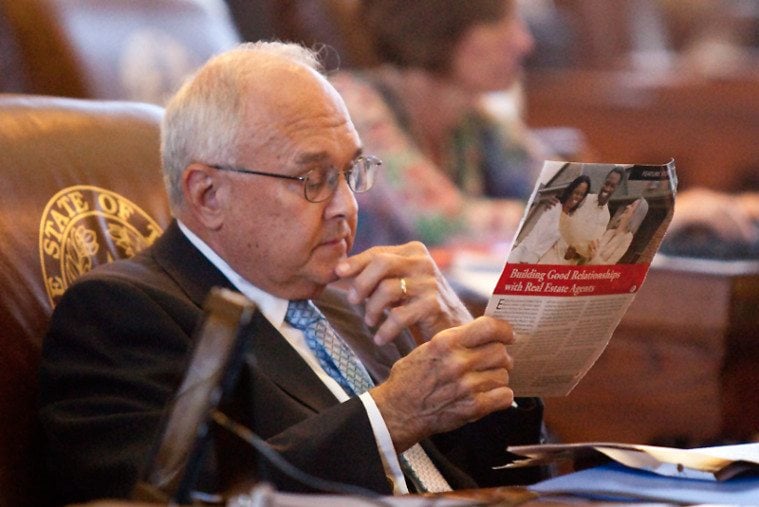
3:48 p.m.:
We’re on amendment 11 now for #HB2. This from Rep Menendez (D) about exceptions for women on psychotropic medications:
— Carolyn Jones (@CJPAustin) July 9, 2013
2:47 p.m.:
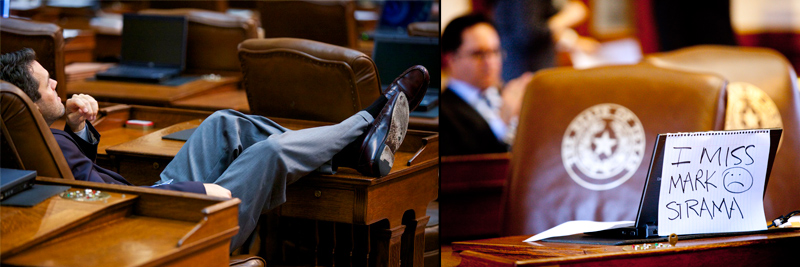
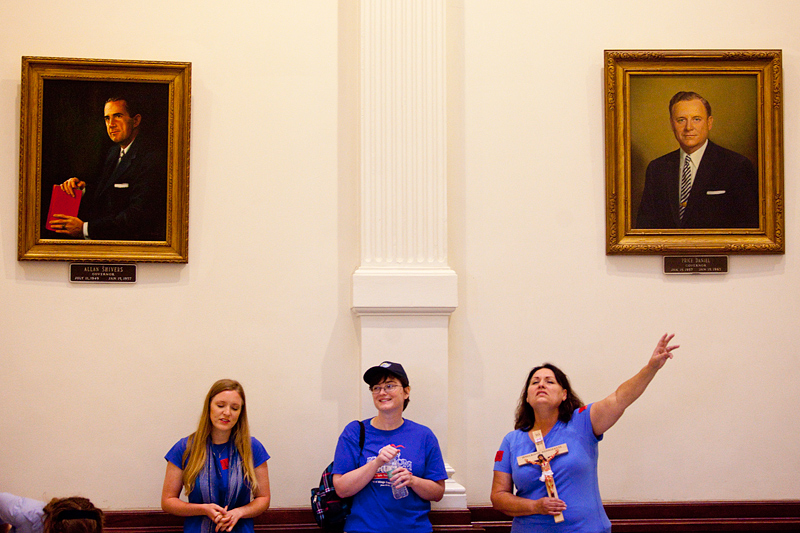
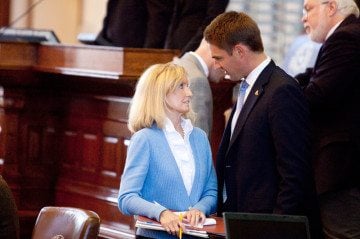
2:15 p.m.: So far, bill sponsor Rep. Laubenberg hasn’t expressed any concern about clinic closures as a result of HB 2. She told Rep. Mary Gonzalez (D-El Paso), who worried about the 1,000 mile round trips her constituents would have to make to access abortions, that she was merely “speaking in hypotheticals”. When Rep. Jose Menendez (D-San Antonio) pushed an amendment that would reimburse rural women who had to travel further as a result of clinic closures, he argued that the provision was hypothetical only. “Whether the clinics close or not,” he said, “this bill is here to protect the people.” In a very non-hypothetical fashion, Laubenberg then moved to table the amendment. Her GOP colleagues voted accordingly. Later, Rep. Craig Eiland (D-Galveston) proposed to strip all but the 20-week ban from the bill. Rep. Donna Howard (D-Austin) at the back mic recited a Texas health department finding that of 75,000 abortions performed per year, only about 400 occur after 20 weeks. Regardless, Laubenberg moved to table the amendment, saying it “pretty much guts the bill.” That amendment failed too. Rep. Rafael Anchia (D-Dallas) took a different tack. He proposed more exceptions for medical conditions as well as greater leeway for doctors making medical judgments. He asked that physicians rather than legislators be the ones to determine what counts as “serious harm.” “We shouldn’t be making these decisions on the House floor,” he argued, but Laubenberg didn’t agree. She moved to table the amendment and the House voted 88-57. 12:55 p.m.: State Rep. Sarah Davis (R-West University Place), a moderate Republican, filed an amendment that would uphold the 20-week ban. However, it would make exceptions for cases like fetal anomalies, many of which are only diagnosed at 20 weeks gestation, and for rape and incest victims whose pregnancies might expose them to risk of suicide. Davis explained that, as a lawyer familiar with the case law pertaining to abortion, she thought that her amendments would give the bill a better chance of surviving a legal challenge by removing some of the ‘undue burdens’. But perhaps feeling confident about the constitutionality of her bill, Rep. Laubenberg moved to table the amendment. Just before the vote, Rep. Davis argued that her amendments supported good policy making. Anyone who voted to table it was clearly only interested in politics, not good policy, she said. The House voted to table the amendment by 89-56. Guess we know what Rep. Davis’ colleagues are most interested in then. 12:43 p.m.:
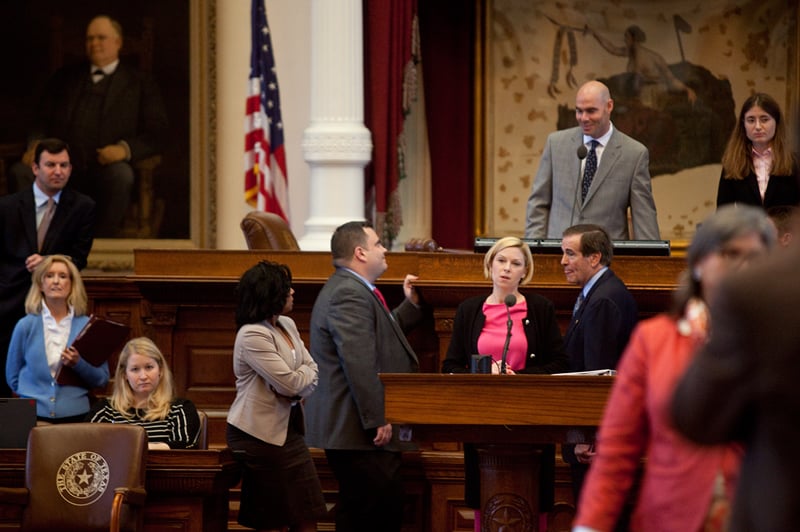
12:33 p.m.:
Here’s the text of Sen Davis’ #HB2 amendment that Sen Laubenberg wants to table: http://t.co/pRuppm5KkD
— Carolyn Jones (@CJPAustin) July 9, 2013
12:15p.m.: Continuing with questions, Rep. Carol Alvarado (D-Houston) voiced the concerns of reproductive health advocates that costly ASC standards would force many abortion clinics to close. Rep. Laubenberg replied: “Raising standards will not force them to close.” She seemed surprised that advocates might think so given that closures weren’t actually written into the bill.
Later, the thunderously passionate Rep. Senfronia Thompson (D-Houston), known affectionately as “Miss T,” took the front mic. Surrounded by Dem colleagues, some of whom held wire coat hangers, she asked that an exception to the 20-week ban be made for victims of rape and incest. Democratic colleagues argued that the trauma suffered by sexual assault victims means that many are in denial, causing some to only report the crime late in their pregnancies.The ban on 20-week abortions would penalize them, they argued.
The Dem team made up of Rep. Dawnna Dukes (D-Austin) at the back mic and and Rep. Thompson at the front, conducted a call and response routine that makes House and Senate debates so much more gripping than they usually are.
Dukes, brandishing a rape kit: “Do you know what a rape kit is?”
Thompson: “Yes, a rape kit is used for gathering forensic evidence.”
Dukes: “Well, the bill author thinks it’s to clean a woman out”, referring to Laubenberg’s gaffe in the first special session when she said that the evidence-gathering kit was used to conduct abortions for sexual assault victims.
Later in the discussion, Thompson flourished a bent coat hanger, a knitting needle, a yellow feather and a bottle of turpentine. She said that she didn’t want HB 2 to force women pregnant from rape or incest to use these to end unwanted pregnancies.
Yet despite her passion and her props, the GOP majority tabled Thompson’s amendment.
11:57 p.m.:
House votes on motion to table (i.e. ignore) amendment to #HB2 for rape/incest. Result: motion is tabled.
— Carolyn Jones (@CJPAustin) July 9, 2013
11:05 a.m.: Watched by a packed public gallery dressed primarily in blue, the House gaveled in at 10:06 a.m. Contrary to a rumor that the Dems might not turn up, the House was indeed quorate. “Our land needs a revival of morality and righteousness,” said a pastor leading the invocation. After two memorial resolutions and drawn out chit-chat on the House floor, the debate on HB 2 finally kicked off at 10:30 a.m. Dressed in a powder-blue suit, Rep. Jodie Laubenberg (R-Parker) read the bill (again) and stated that she planned not to accept any amendments. Rep. Jessica Farrar (D-Houston) led with questions. To anyone following the progress of this omnibus bill through two special sessions, they all seem terribly familiar. Farrar asked Laubenberg whether regulatory requirements would increase costs for women seeking abortions, whether strict ASC regulations were necessary for medical abortions, whether the bill would intervene in the doctor-patient relationship. In a soft monotone, Laubenberg replied that the bill increases patient safety and that doctors had the authority to determine who might quality for exemptions. Parroting a line she and her GOP colleagues used frequently in the last session, Laubenberg also said: “Abortion is the only procedure where the expected outcome is the taking of a life. It’s a unique procedure.” Questions from Democrats continue. Meanwhile, many other House representatives are gathered in little clumps of conversation around their desks. Few seem to be paying attention to the content of today’s debate. 11:01 a.m.:
In response to q. from Rep Alvarado, Laubenberg doesn’t believe clinics will close. ‘Raising standards will not force them to close’ #HB2
— Carolyn Jones (@CJPAustin) July 9, 2013
10:59 a.m.: Rep. Jodie Laubenberg sticks to her guns on HB 2.
Laubenberg: ‘My goal is stop abortion at 5 months based on the science and technology that we have today’ #HB2
— Carolyn Jones (@CJPAustin) July 9, 2013
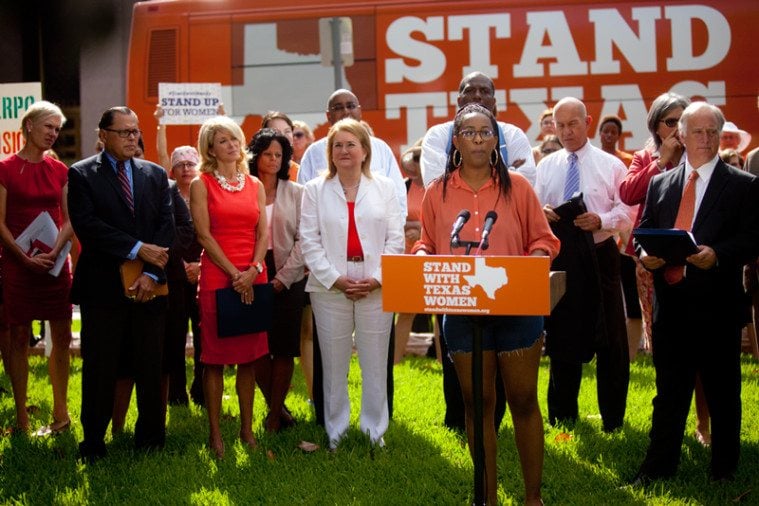
9:45 a.m.: This morning, the full Texas House convenes at 10 a.m. to vote on HB 2, the controversial anti-abortion bill that has sparked weeks of fervent protest in and outside the state Capitol. HB 2 would ban abortion after 20 weeks, force abortion clinics to meet the stringent standards of ambulatory care centers, require women seeking medical abortions to come for multiple in-person appointments with a physician, and require abortion doctors to have admitting privileges at nearby hospitals. Proponents of the bill argue that these regulations improve patient safety and save innocent lives. Opponents say that the restrictions are so harsh that they will make abortion inaccessible and unsafe.
Before the House convenes, Planned Parenthood Action Fund is holding a press conference outside the Capitol to launch a statewide Stand With Texas Women tour. Cecile Richards, president of Planned Parenthood Federation, and Senator Wendy Davis, she of the famous filibuster, will speak. They will launch a series of events across the state this week to urge legislators to protect women’s health.
The Observer will be live-blogging events at the Capitol today. Check back for updates.
